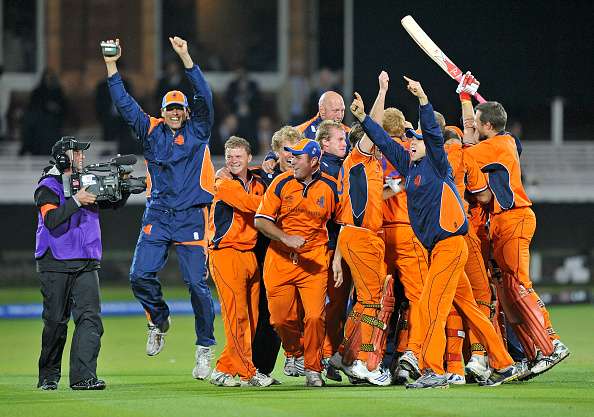By Tim Wigmore
From 5,000-1 outsiders to title winners. No wonder the tale of Leicester City has resonated far beyond football.
At its core this is not merely a sporting story at all: rather it is a classic David and Goliath tale, of expectations being defied and the puny toppling the mighty. In a world in which we have been conditioned to thinking that the elite will have it all – from Manchester United winning a majority of titles since the Premier League was formed, to the one per cent hoarding ever-more power and money for themselves – Leicester City’s triumph is a wonderful antidote. Sometimes the underdogs can be kings.
International sport has long proved this is possible. In 1992, Denmark were preparing to watch the EuropeanChampionships lying on the beach when they were called up to replace Yugoslavia in the tournament: they promptly triumphed. Greece’s victory in 2004 was scarcely more likely. Japan’s heist against South Africa in last year’s Rugby World Cup was a reminder that even uber-professionalised modern sport can find room for intoxicating triumphs.
Cricket has not been immune to such sporting romance. Before the 1996 World Cup, Kenya’s players asked their board for white balls to prepare for the tournament. The Kenyan Cricket Association could afford to give their players only red balls painted white. Yet that did not stop Kenya from bundling the West Indies out for 93 to secure a remarkable victory in Pune. In 2003 they went all the way to the World Cup semi-finals, dispatching three Test teams in the process.
Underdogs have had their days much more recently. Think of Ireland’s three World Cup campaigns, including victories over Pakistan, England and the West Indies; Afghanistan’s rise, including their defeat of the West Indies in this year’s World Twenty20; and even Oman’s motley crew defeating Ireland in the WT20.
These all serve as evidence that international cricket has never had such strength in depth. The best should be yet to come: the number of cricketers beyond the Test world rose from 500,000 to 1.4 million between 2010 and 2015 and, as the surge in viewing figures for matches between Associates shows, interest beyond the full member world has never been so strong.
Yet international cricket does its best to thwart romance. The attitude of cricket’s governing elite is too often not to embrace the wanabee Leicester Citys, but shun them.
The problem is that international cricket’s entire structure is designed around status rather than merit. Fixtures, money and the ability to play Test cricket are not governed by on-pitch performance, but by grubby politicking in Dubai.
That’s why, while Ireland played only nine ODIs against Test teams between 2011 and 2015, Zimbabwe are about to welcome India for their fourth ODI tour in six years. It’s why, despite being ranked above Zimbabwe in T20I cricket, Scotland get over $6 million a year less from the ICC. And it’s why, after 139 years, there are still only ten Test nations.
Throughout its history Test cricket has said it does not want Leicester Citys. New nations have been denied the chance to reach Test cricket, no matter what they do on the pitch. Who is allowed to play the longest format of the game has always been determined by the men in suits, and not the performance of men in boots.
Qualification for world events is little better. Unlike in all other major sports, qualification for tournaments is determined by status not merit.
So while Iceland knocked out the Netherlands to qualify for Euro 2016, it couldn’t happen in cricket: in every previous World Cup, full members have qualified automatically as a privilege of membership.
If the system used towards the 2019 World Cup, whereby the top eight teams in the rankings reach the tournament automatically and the rest enter a qualifier, seems actually marginally better than that used for previous tournaments, it suffers from one fatal flaw: the rankings lack integrity because Associates get so few matches.
Even with their recent announcement of more ODIs against Test teams, it is almost impossible for Ireland to qualify automatically for the 2019 World Cup before the cut-off date at the end of September 2017. But Ireland are the lucky ones: other Associates like Hong Kong, Scotland and the Netherlands are not even on the 12-team rankings table at all. They could win every single one-day game they play and would still not earn automatic qualification.
And Associates’ chances of reaching the World Cup have never been slimmer: the 2019 and 2023 tournaments are due to consist of only ten teams apiece. As if that was not bad enough, the qualifiers for the 2019 tournament, held in England, will be in Bangladesh. It all means that cricket is missing out on its Leicester Citys. While football, for all its inequities, embraces the idea of a side progressing through the divisions and realising Andy King’s dream – he has won League One, the Championship and now the Premier League with Leicester – cricket maintains a caste system designed to shut upstarts out.
Many in the ICC know this needs to change. The current structure of the game, a mish-mash of bilateral games with no context, is putting off viewers, leaves economic value unrealised, and means that players and teams from beyond the Test world are doomed to be regarded as second-class citizens simply because of where they are born.
Shunning emerging nations also risks the future health of cricket. The fall in interest in the Indian Premier League this year is a warning that cricket’s dominance over India is slowly being eroded. Cricket needs new viewers – in China, Ireland, the United States and beyond – as an insurance policy.
That is why the ICC Annual Conference next month will contain a raft of radical proposals designed to make the international game more meritocratic. Two divisions in Test cricket, with promotion and relegation between the divisions and the Intercontinental Cup underneath, will allow emerging nations to dream of doing a Leicester City; even if that sounds fanciful, countries like New Zealand would cease to be starved of Tests and be able to aspire to being crowned champions of the Test world. Leagues in ODI cricket, stopping Associates being shunned by full members if they are good enough, and an end to full members’ automatic qualification for the World Twenty20 – meaning that unheralded nations could topple the traditional giants just as Iceland did to the Netherlands in football – are also being discussed.
Rather than being run as a cosy cartel, cricket would finally be a sport that began to embrace its Leicester City equivalents.
But for all this to happen full member representatives, including England, will need to put short-term greed aside and create a structure that embraces the meritocratic principles that should be at the core of sport.
Any waverers need only look at Leicester City now or Japan’s rugby side last September to know what is at stake: the sense of sport being determined by competition between teams on the field, not between faceless businesses off it.
Sport’s raison d’etre is meant to be escape from the real world, and there is no better escapism than seeing the mighty vanquished.
This piece originally featured in The Cricket Paper, Friday May 6 2016















